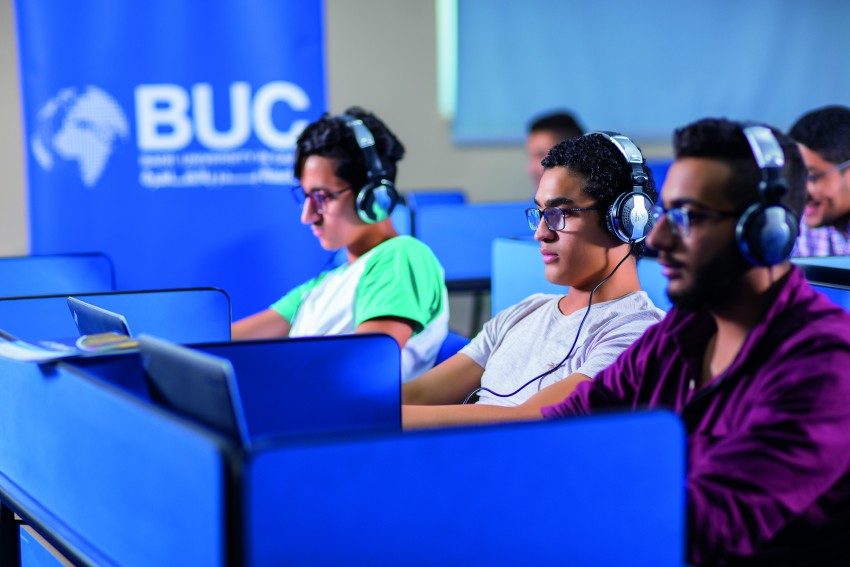With sweeping education reforms, Egypt’s enormous youth population will soon have the tools it needs to drive the economy forward.

“Do you want real education or do you want your kids to just get ‘degrees’?”
This hard-hitting message, delivered by President El Sisi at the Sixth National Youth Congress, set the stage for the implementation of Egypt’s new education system, which aims to turn decades of rote learning on its head and bring in a new focus on technology, in order to future-proof Egypt’s vast human resources.
As recently as 30 years ago, Egypt represented the pinnacle of educational prowess in the region. Its doctors, teachers and engineers were a prized resource in the Gulf and beyond, which led to the Egyptian variant of Arabic becoming the lingua franca of the Arab world. But a failure to modernize the system saw the country fall behind. By 2018, it ranked 129th globally in terms of the quality of its education. As President Sis pointed out during his speech: the current system produces neither well educated nor highly skilled citizens, resulting in a mismatch between their qualifications and market needs.
This year, however, this is set to change. President El Sisi has declared 2019 the ‘year of education’, boosting public spending on the sector by 8 percent. Today, Egypt’s education system is set to become a showcase for Egyptian renewal.
At the beginning of the current academic year last September, Egypt’s 22 million public school students started studying an entirely new curriculum, as part of Vision 2030, an agenda focusing on economic, social, and environmental developments in the country.
Empowering Egypt’s youth is key for its future development, and this new focus on education will, the government hopes, allow them to take part in building the future of their country by enabling them to qualify for skilled jobs.
While the government is a key actor in promoting a better education for Egyptian youth, the private sector plays a vital role. The founders of Badr University, which opened its doors in 2014, have long worried about the divergence between the knowledge and skills genuinely needed by the Egyptian economy versus the knowledge and skills possessed by university graduates, and have sought, in the five intervening years, to address this issue. “When I started all this effort 25 years ago, I said I wanted to create a locomotive to take Egypt forward,” explains Hassan El Kalla, the university’s chairman. “I need to see my graduates everywhere occupying leading positions to make Egypt the star it should be.” He adds that Egypt occupies a fundamental place in human history, and that its education standards should reflect this.
Cognisant of the potential to create a two-tier education system, divided between those who can afford top schools and those who cannot, Mr. El Kalla has sought from the very beginning to make Badr University as affordable as possible. “While we’re keen to provide quality education, cost containment is our religion. There’s always a way to save money and still produce a quality product, and that’s what we’ve been trying to do all the time since we started. We’re going to contribute to Egypt’s progress. After succeeding in showing that this model is working and replicable, we have then moved to creating a bigger mass to be really able to impact education in Egypt.”
Another initiative underway to reduce wealth-based inequalities in education in Egypt is the scrapping of the Thanaweya Amma. This standardized test – the secondary school leaving certificate – determines entry into university, and the high stakes involved have traditionally seen those families who can afford to do so turning to private lessons outside the school. The new education system will switch to a grade point average (GPA) system, based on the three years of study in that educational stage, instead of the final year in the current system. To ensure transparency, it will be mainly based on technology, with tablet devices being provided by the government to students and teachers. Unveiling the new approach during the National Youth Conference, the country’s education minister said that he believes that the new system will eliminate the phenomenon of cheating and private tutoring, and will increase learning and creativity skills in students.
The potential of Egypt’s education sector is demonstrated by the interest shown by the private sector in investing in it. Cairo for Investment & Real Estate Development (CIRA) is Egypt’s most acknowledged investor in the area of education, serving over 14,000 students. Its managing director, Mohamed El-Kalla, explains its attractiveness. “The Egyptian middle class alone is larger than the population of three or four other Arab countries combined. We are the first entity to provide blended learning to the masses in Egypt, and the first entity that looks at the middle and lower-middle class with specialized services.” The firm, which started investing in schools in Cairo, has now moved to other governorates. “We’re in Minya, we’re in Asyut, we’re in Hurghada, we’re in Suez, we’re opening in Delta… We’re seeing where Egypt is growing and we’re always there. We open schools in new cities before people start moving in, that means that we are part of the story of why people would like to move to a new city, because the school is there.”
Egypt is already the third-most popular destination country for international degree students within the Arab world, surpassed only by Saudi Arabia and the United Arab Emirates, and nine of its institutions were included in the top 31 of the 2018 Times Higher Education ranking of universities in the Arab world. As it overhauls its education system, it looks set to regain its position as the academic hub of the region.
0 COMMENTS